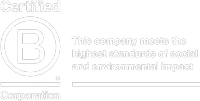This is Part 3 of a 3 part series. Read 1 here and 2 here.
Purpose starts with awareness.
If you want to build a meaningful, spirited brand that owns its space, and a company that truly acts in alignment with its values, focus on intrinsic motivation in your business and brand strategy. What drives your company at a human level? What drives your ideal customer? How can you create empathic alignment to bring out the best in each other?
By understanding our own intentions, actions, thoughts and feelings, we are able to better understand the intentions, actions, thoughts and feelings of the people who our companies rely on to succeed. When we act without that clarity first, we are only reacting to external factors and are ignorant of the long-term consequences. When we are self-aware, we can be proactive and intentional in what we’re creating. We’re then able to respond authentically rather than just react to the ever-changing climate.
As a society, our value system is changing. Education levels have risen, and global awareness of life options and possibilities has soared. We are becoming a much more conscious society, we are shifting from materialistic influences to others-centred influences, and our expectations of business have changed. This shift in business values is described by Raj Sisodia and Jag Sheth in the 2014 book, Firms of Endearment:
‘The remaking of capitalism into an instrument of broader purpose appears unstoppable. Companies that fail to recognise this court disaster. Stakeholders are increasingly demanding more socially aware management from companies. Customers will vote for this by closing their wallets to companies that don’t comply. The best employees will hire on elsewhere. Suppliers will favour companies that treat them with respect. Communities will make it tougher for companies that place shareholders high above all. And financial markets will restrict the flow of capital and raise its cost.’
A purpose-led business actively and intentionally nurtures positive values, relationships and experiences with all stakeholders. It values people and purpose over profit. And the outcomes of companies beginning to measure their success beyond size and profit is an exciting time for us all to be living in. At the World Economic Forum in Davos in 2015, executives from the world’s largest companies were affirming the power of having a purpose over profit in driving innovation, customer loyalty, differentiation, employee morale, recruitment, productivity and organisational agility. Purpose-led businesses actively endeavour to become more aware, awake and intentional in their leadership, culture, strategies, communications and marketing.
“In any company, you have to go back to what drives people. Making more money or being bigger means less and less. Brands with a purpose and that are values-led over time are going to be by definition more successful.” Paul Polman, CEO Unilever
We believe there are six pillars to focus on for a purpose-led transformation:
1. Higher Purpose
For your company it starts on the inside – what do you value? What’s important? You need to discover your higher purpose – it’s not something that can be made up by an executive team or an agency! It needs to be discovered, which means plenty of communication, collaboration and curiosity.
I spoke to author Carolyn Tate recently about uncovering purpose and she says to find your purpose activists. Those are the self-leaders within your organisation not the appointed leaders. She’s an advocate for creating ‘pockets’ of purpose throughout an organisation in order to create a ripple effect for greater change. Something she calls purpose projects… and she’s written a book The Purpose Project that explains the concept in detail.
Here are some questions to get you started:
- What about your industry (or the world) makes you cringe?
- What is your business doing about it?
- How does this help you become better and different?
- How does it serve the world?
- Why is it important to you as people?
2. Purpose-Driven Strategy
A purpose-driven strategy can be described as ‘one that refers to its purpose to drive, integrate and evaluate everything an organisation does in order to ensure it creates its desired future.’ All strategies, ideas, and tactics need to stem from the purpose of your business, its ‘seed’.
It’s not just what you stand for, but HOW you stand for it that matters.
- Visualise how you want the future to look and the values it will require to get there
- Identify how you will align people, product and promotion to your purpose
- Identify your ‘flames or activists’, people who will lead the strategy and how it will be brought to life. It will need courageous leaders.
3. Intrinsically Engaged People
The old model for employee engagement rested mostly on extrinsic motivators – like money, bonuses, benefits and titles. Today, it has been proven that people are more motivated by intrinsic value and meaning in their work.
Leadership used to be about giving all the directions, having all the answers – a command-and-control approach with carrot and stick incentives. Authentic leadership is about being real, vulnerable and is based on servitude. It’s about being driven by the broader purpose of the company, not just the bottom line.
- Understand humanity and what makes people tick
- Embrace authentic leadership
- Strive for something bigger together
- Be really clear about your brand, values and goals so people are empowered to take ownership of the HOW
- Give people a sense of value, capability and progress
4. Conscious Communication
Conscious Communication is about ensuring that all company and brand communications are aligned with your values and empower positive and intrinsic motivators. This approach creates highly effective communications and builds brand trust. Promotion becomes simpler, more focused, less time-consuming and less costly. Rather than being a squeaky wheel, you earn attention. Through this, existing customers become long term advocates, and new business is more likely to come through word of mouth and reputation. With this approach, the communications are also working to reinforce positive values in society as a whole.
In his book, Winning The Story Wars, Jonah Sachs talks about the power of stories to change a culture. Business needs to go beyond the sell in order to find and tell a story that inspires people. He suggests that brands that tell values-driven stories, may just become humanities greatest hope for the future.
- Focus on intrinsic values
- Be relevant, focus on your customer
- Be honest and transparent
- Show respect in your communications
5. Empathetically Connected Customers
When customers genuinely feel understood and appreciated, their loyalty and advocacy will be strong. At a company level, this requires a culture of understanding customers at their core and genuinely wanting the best for them, and a drive to deliver value how and when customers really want it.
Often this is taken to a deeper level, with companies looking to have a positive influence on customers and actively encouraging intrinsic values within them. As a result, an intense emotional bond can develop, where the customer can see the direct improvement in their life.
- Find your emotional differentiator and personality
- Put customers at the forefront of everything you do
- Research, get closer
- Really listen
- Have honest communications
6. Agility + Responsiveness
The modern world is ‘always-on’ with change being more dynamic each day. Purpose-led businesses are able to use their vivid goal and their defined purpose as a framework for change and direction. This framework empowers entire teams at every level to make the right decisions as everyone now has a benchmark to compare against. Innovation becomes faster because teams are more motivated and are only restrained by a clear purpose. Being agile, they are able to stay true to their purpose and values while transforming to adapt to changing market demands and customer expectations.
- Be guided by your principles, not brand ‘rules’
- Focus on becoming more self-directed
- Employ and partner with aligned people
- Adopt a ‘we’ mentality
- Focus on being relevant, not just consistent
- Practice cross-pollination
Let’s create a better future for business.
This is an excerpt from what Nikki shared at the Think. Learn. Connect. Event in May 2017.
Find clarity and authenticity in your brand through our Brand Diagnostic.








